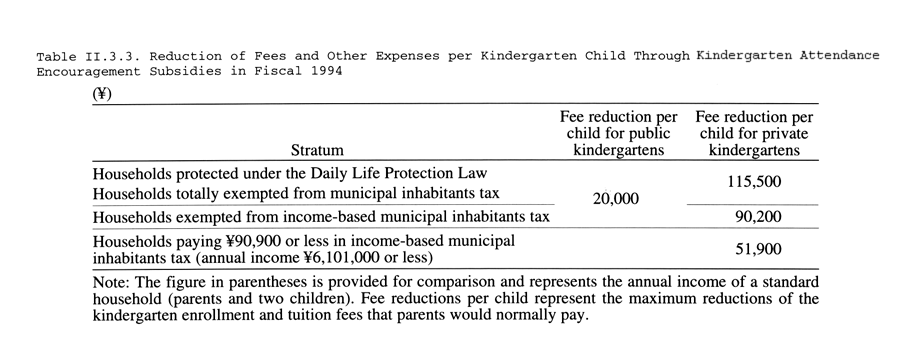| Home > Policy > White Paper, Notice, Announcement > White Paper > JAPANESE GOVERMENT POLICICIES IN EDUCATION, SCIENCE AND CULTURE 1994 > PART II Chapter 3 Section 5 2 | ||
The Ministry of Education, Science and Culture is responding to this situation by taking steps to ensure that every kindergarten child receives education that meets his or her individual needs.
The new Course of Study for Kindergartens, which was implemented in fiscal 1990, states that kindergarten education should be provided basically through the environment and that priority should be given to instruction and other activities that accord with the developmental characteristics of each child. Courses, seminars, and other programs are currently being conducted, and teacher's reference materials have been prepared to ensure the smooth realization of these aims. In addition, specialized courses for mid-career teachers have been offered since fiscal 1993 and courses for kindergarten principals and other staff since fiscal 1994, with the aim of enhancing and systematizing in-service teacher training programs.
A variety of research is being carried out regarding overall approaches to kindergarten education. In addition to research commissioned to prefectural governments and other organizations and research at pilot schools, the Ministry of Education, Science and Culture has established a consultative committee to study issues related to the development and enhancement of the staffing levels and physical conditions of kindergartens. This committee is currently conducting research and surveys.
The Ministry of Education, Science and Culture provides subsidies to municipalities that implement attendance encouragement programs for kindergartens in order to reduce the expenses borne by parents and to alleviate cost imbalances between public and private kindergartens. Table II.3.3 shows the eductions of fees per kindergarten child in fiscal 1994. Other efforts to promote kindergarten education include the provision of increased subsidies to defray the cost of improving facilities, including the establishment, expansion, and renovation of public and private kindergartens.

| Back to Top | MEXT HOME |